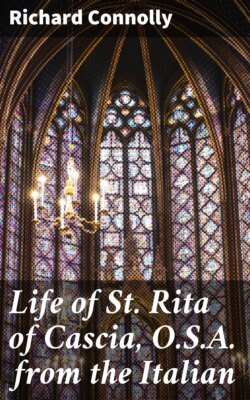Читать книгу Life of St. Rita of Cascia, O.S.A. from the Italian - Richard Connolly - Страница 6
На сайте Литреса книга снята с продажи.
RITA'S PARENTS
ОглавлениеTable of Contents
The fortunate parents of Rita were Antonio Mancini, of Rocca Porena and Amata Ferri, who is believed to be from a village called Fogliano. Antonio was not noble, nor had he a title, but we may apply to him the praise which the Holy Spirit gives to Noah—that he was a just man and perfect in his times, and he walked with God. The Gracchi, the Scipios, the Cæsars among the number of their family honours cannot find a title greater or even equal to this.
Every other superiority is vanity, and if there be glory from other titles, it is the glory of another, which cannot pass to the posterity of those who merited it. Justice alone makes that real nobility which St. Augustine and other holy fathers call nobility according to the heart of God. And although even this cannot be passed on to descendants, as it did not pass from Noah to his son Cham, whom he cursed, yet it is not unusual for God to recall the justice of parents, not only for a model, but to give a certain extrinsic glory to their descendants. Hence, when the Holy Spirit wished to record the praises of St. John the Baptist, He wished also for his honour that we should remember that his parents were both 'just before God, walking in all the commandments and justifications of the Lord without blame.' So we can also say of Antonio and Amata, of whom was born St. Rita, who had a special devotion to St. John. They were not of noble blood, but they were noble in their works; they were not rich in temporal goods, but they were rich in the true treasures of Divine grace, which do not pass from those who possess them. They enjoyed the esteem of all who knew them, an esteem more precious than that which flattery offers to the rich and great of this world. Their fortune constituted that mediocrity which the wise man sought from God in order that abundance might not tempt him to forget his Creator, nor poverty to give himself a prey to any vice. The industrious and honourable labour, and the innocent pastoral life which in their time did not degrade the Patriarchs Abraham, Isaac, and Jacob, did not make the Mancini family less worthy of honour. Rather from the fruits of their labour did they acquire the means of exercising a beneficent liberality towards the poor of Jesus Christ, whom they cherished with an ardent charity. Whether the fruits of their fields were abundant or scarce, these two happy ones, husband and wife, lived contented in their frugality, always giving thanks to the Giver of every good gift, and placing themselves entirely in conformity with the most just and providential dispositions of heaven. Perfect concord, which was their dearest virtue, since in it is the fulness of the law, always reigned in their home. And hence when they heard of divisions amongst others, which were only too frequent in that age and country, they were speedily present with them, and with their insinuating manners and holy zeal they insisted in their charitable offices till peace was restored. They were, on this account, commonly called the 'peacemakers of Jesus Christ.'
They corrected the erring according to the rules of the Gospel; they interceded for them with so fervent prayers, with so great concern, and with so happy results, that, like Moses, they appeared to be constituted mediators between the people and God. They steadily hated vice, and practised every virtue. The book from which they learned and cherished sentiments so virtuous was none other than the Passion of the Redeemer. It furnished them with inexhaustible matter for their meditations, for their liveliest compassion, and for that remarkable piety which, from her cradle, they instilled into the heart of Rita, and which they left her as a heritage. In a word, it may with reason be said of them what was said of the parents of St. John the Baptist—that they were both just to the eyes of God, walking without stain in the exact observance of the law. This was their nobility, this was their wealth, which it pleased God to pass to their daughter and to multiply in her in a singular way. Thus we may say, as Blessed Simon of Cascia writes, that the parents' goodness instilled the best dispositions even before her birth into her who was to be born from them, as the goodness of Zachary and Elizabeth went to exalt the holy precursor St. John.
Thus these two holy souls, husband and wife, lived a long series of years in these exercises of virtue and piety, without, however, seeing any fruit of their chaste union. God so disposed it that the desires of their youthful years should be vain, that they should labour to detach their minds still more from mortal things, and in order that the proofs of an extraordinary work of His providence should one day shine the brighter. Meanwhile, their desire of offspring, with which nature innocently inspired them, had not only grown cold with advancing years, but was quite extinct; no other care should remain with them now than that of ascending to the eternal heritage of the heavenly Father, instead of descending to the care of children and transmitting their temporal possessions to their posterity on earth.
